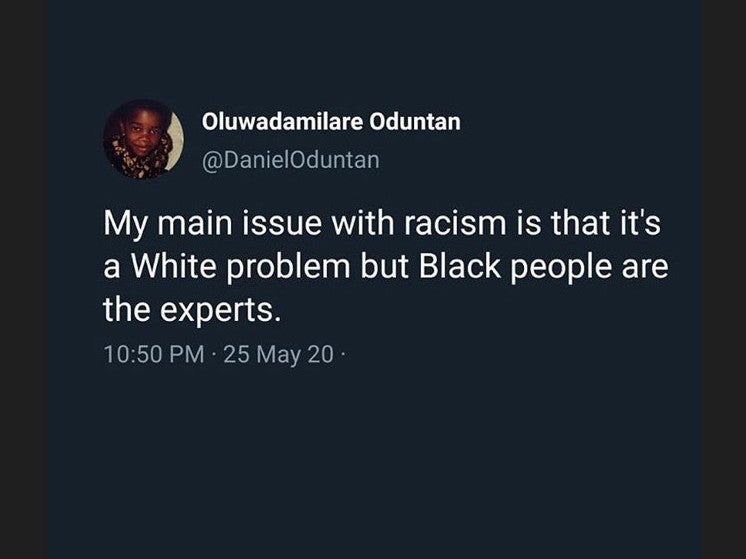White people, the responsibility of ending racist systems rests on your shoulders
Guilt has little use now, we need to see courage and action. In the same way that you love black culture, you need to show up for our struggles too

Your support helps us to tell the story
From reproductive rights to climate change to Big Tech, The Independent is on the ground when the story is developing. Whether it's investigating the financials of Elon Musk's pro-Trump PAC or producing our latest documentary, 'The A Word', which shines a light on the American women fighting for reproductive rights, we know how important it is to parse out the facts from the messaging.
At such a critical moment in US history, we need reporters on the ground. Your donation allows us to keep sending journalists to speak to both sides of the story.
The Independent is trusted by Americans across the entire political spectrum. And unlike many other quality news outlets, we choose not to lock Americans out of our reporting and analysis with paywalls. We believe quality journalism should be available to everyone, paid for by those who can afford it.
Your support makes all the difference.The air is thick with grief.
We mourn the hundreds of thousands of lives taken by coronavirus globally – the true death toll of which may never be known.
We mourn our loved ones and key workers who died alone then were buried in the presence of just a handful while the rest of us said our final goodbyes over video call.
As this rampant virus continues to cause chaos across the global community, another devastating disease has not only been left to fester – it has been exacerbated.
Racism is a familiar blade, and for those of us at its sharp end, the killing of George Floyd in Minnesota has not surprised us. However, compounded by the injustice of a Covid-19 landscape in which black people have been, once again, hit the hardest according to data from the Office for National Statistics, this instance of brutality feels like the last straw.
Black women in the UK are 4.3 times more likely to die from Covid-19 than white women, while black men were 4.2 times more likely to die. The report went on to say that these alarming disparities seem to be “partly a result of socio-economic disadvantage and other circumstances, but a remaining part of the difference has not yet been explained”.
Spoiler alert: it’s no mystery – structural inequality kills.
In the USA, the country with the highest number of confirmed cases of coronavirus (with Brazil, a majority black nation, right behind), black Americans represent 13.4 per cent of the American population, but counties with higher black populations account for more than half of all Covid-19 cases, and almost 60 per cent of overall deaths according to reports from CNN.
Add being killed with impunity by the police and it’s clear why the current landscape is simply too much to bear, too much to ask of anybody. Now neighbourhoods in the USA are on fire. Across the world, the homes of black people have been on fire for centuries. And each time, the onus has been put on black people to dismantle their subjugation themselves and to remain calm while doing so.
A viral tweet making the rounds sums this dichotomy up succinctly: “My main issue with racism is that it’s a white problem but black people are the experts.”

It speaks to Toni Morrison’s reminder that “white people have a very, very serious problem and they should start thinking about what they can do about it”.
Over the last few days, I have felt fury and sadness. I don’t like feeling helpless. But I was also filled with a new sense of conviction that the silence of the white people that surround me is now – even more so than before – completely unacceptable.
Silence is betrayal at best, and at its very worst, it is the foundation of all covert expressions of white supremacy, along with indifference (which looks like not confronting the casual or wildly racist comments of your family and friends); minimisation (which looks like claims of “we are all one race, the human race”); veiled racism in the form of “jokes”, gaslighting and victim-blaming, right through to calls for violence against black people and the freedom to enforce that violence with impunity. You may not have directly inflicted physical pain on black people in your lifetime, but figuratively – in many cases, of course, literally – your knees have been pressed on our necks for centuries.
The realisation that being anti-racist is a verb, a doing word, seems to be dawning on people. As is the case each time there is a high profile killing of a black person (usually a cisgender black man, but do not forget the names of Breonna Taylor and Tony McDade), white people begin to ask “what can I do to help?” And many will feel they “can’t get it right”.
The pursuit of understanding racism is not a righteous one – to create change, you must be humble enough to make mistakes, apologise with your whole heart, and be ready to keep trying. That is truly what is needed now.
Some folks want to be spoon-fed answers. That is not how you learn. Fortunately, we are in an era of widely accessible knowledge – the same internet you use to ask me to teach you is the same place Google lives. Many, many generous writers and thinkers have written about race, civil rights, white privilege, and what allyship looks like.
Head to Twitter and Instagram and you’ll see that black people and people of colour have created resources with the answers you’re searching for – start there. Educate yourself and then educate your friends and family by having the necessary painful conversations black people have been having in our families and communities again and again.
I believe guilt has little use. We need to see courage and action.
As Rihanna reminded us in her NAACP awards speech, it’s time for you, all of you, to pull up to the movement.
In the same way that you love black culture, musicians and artists; our foods, beaches, carnivals and our rhythm, you need to pull up for our struggles too.
Pull up as we demand justice for Belly Mujinga, as the British Transport police close her case and take no further action.
Pull up as we demand justice for the deaths of black people in custody and at the hands of police officers in the UK. Despite what you’ve been told, police brutality is rife in this country too.
Pull up and put your money where your mouth is, put your bodies on the line with us, and put action to your words.
Pull up and challenge other white people – be prepared to be uncomfortable and maligned, a feeling black people know too well.
And finally, get ready to make necessary sacrifices in this struggle. Remember, nothing worth having was easily won
Siana Bangura is a writer, producer, performer and community organiser hailing from South East London, now living, working, and creating between London and the West Midlands.
She is the founder and former editor of Black British Feminist platform, No Fly on the WALL; author of poetry collection, “Elephant”; and the producer of “1500 & Counting”, a documentary film investigating deaths in custody and police brutality in the UK.
Siana works and campaigns on issues of race, class, and gender and their intersections and is currently working on projects focusing on climate change, the arms trade, and state violence.
Across her vast portfolio of work, Siana’s mission is to help move marginalised voices from the margins, to the centre

Join our commenting forum
Join thought-provoking conversations, follow other Independent readers and see their replies
Comments